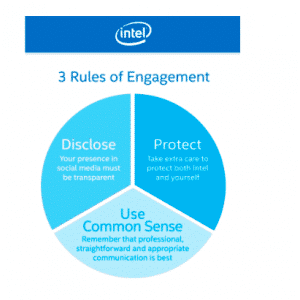Social media platforms offer a plethora of opportunities to connect with your audience and build your brand’s reputation online. This makes managing and regulating your communication on social media absolutely crucial.
A social media policy helps you outline how an organisation and its employees should conduct themselves on social media channels. It helps safeguard your company’s online reputation and encourages employees to also get involved in building your brand’s voice online.
In this blog, we will explore the importance of having a social media policy in place and what are key elements a policy must entail. So, let’s dive in…
Contents
Why does social media policy matter?
A well-crafted and enforced social policy is your brand’s code of content. It guards you against falling into potential risks owing to violation of certain rules and regulations online. In a nutshell, a social policy lets you:
- Defend against legal issues: Social media entails complicated considerations for things like privacy law. Luckily, strong social media policies outline the risks of communicating online and keep your employees away from any potential legal troubles
- Protect your brand: Your social media policy ensures that whenever someone interacts with your brand online, it is either through a verified/branded platform or an official employee. This develops a more reliable, trustworthy identity for your company, where your customers have a consistent brand experience.
- Empower your staff: Social media policies allow you to unlock all the benefits of employee advocacy, without putting your brand’s credibility at stake. It gives your people the guidance they need to accurately represent your company online and build its reputation.
What to include in your social media policy?
At a fundamental level, every social policy must cover consequences and guidelines regarding sharing proprietary or confidential company information, posting defamatory, or inflammatory content, and sharing information or pictures that imply illegal conduct.
We have listed below some of the other components to cover in a social media policy:
-
Identify your key spokesperson
Too many cooks, spoil the broth. The first and foremost thing any social policy should do is figure out who can speak on behalf of your business online.
Walmart is a classic example here to take inspiration from. The retail giant states that no employee should answer customer complaints or questions directed towards the company.
The degree of freedom you give your employees will depend on the nature of your business. If you do allow your people to offer advice to customers, it’s a good idea to train your team internally on your brand guidelines, etiquettes to communicate on public platforms online and which details should be kept confidential.
-
Prepare your Plan B
It’s easy for conflicts to flare on social media. Given that public sentiments are highly volatile, and changes rapidly, even a rookie mistake can escalate quickly. Therefore, like any other strategic document, a social media policy must be well-crafted in light of potential consequences.
Having a plan B is super important. If someone leaves a negative comment about your brand online, or you find yourself in an argument, make sure your employees know how to respond or manage the situation well.
Social media policy can help you create a go-to set of guidelines for your employees to handle crises. An excellent way to make sure that conflicts are always handled properly from the start is to set up tested and approved responses to generic situations.
The most important bit here is to train your employees in reacting on social media when they’re representing the company – even if it is through their personal accounts.
You can use social media listening tools like Hootsuite, Brandwatch, or Sprout Social to gauge the sentiments of any particular campaign or map your overall brand sentiment and create your response sheet accordingly.
These responses let your audience know that you’re aware of their concern and direct them towards the right person to resolve the problem. The quicker you’re aware of a problem, the easier it is to fix it before the fire spreads.
-
Consider potential legal risks
Owing to the impact social media carries, your communication must be validated by concerned authorities/institutions before you commit any claim online. Your social media policy must provide clear guidelines on how to handle sensitive concerns, particularly regarding the law and industry regulations.
Therefore, do ensure your policy covers:
How to validate sources: Where did the information your employee is sharing come from? Checking images and other information like data or statistics is crucial.
Privacy and disclosure procedures: Let your people know about confidential information, such as client data.
Regulatory challenges: Certain industries like finance, government, healthcare, and so on have specific regulatory clauses. Chalk out any rules that may be associated with your industry and make sure you comply with those regulations.
-
Keep your employees (and brand) secure
Finally, using social media with caution is essential to keep scammers and hackers at bay. It’s important for your social media policy to cover guidelines that protect your employees and your company.
Whether it’s defending against phishing scams or ransomware attacks, make sure that everyone in your organization is vigilant about online protection.
Include guidelines in your organisation social media policy that encompass:
- How to create secure passwords and set up two-factor authentication for brand and personal social media accounts.
- How to identify potential social media risks and attacks
- How to keep devices secure and software updated
- How to respond if a security breach takes place
For social media policy examples that take security seriously, look at Intel.
The safer your employees are with their social media actions, the more secure your business becomes.
In closing
As impactful as social media is for your brand, it’s not always easy to navigate through it.
Social media in the workplace doesn’t have to be a scary thing. All you need to do is put effort into developing a social media policy that works for all.
Your employees are already active on social channels and they have the power to deliver incredible results for your company. With social media policy and guidelines, give your people the freedom to support your business with a sense of direction.
If you need a headstart in creating a social media policy, do check out our free template under downloadables!







